Business Law Handbook: Start-ups - Legal Framework & Dispute Solutions
VerifiedAdded on 2024/06/28
|23
|5408
|166
Report
AI Summary
This report serves as a legal handbook for start-up companies, providing guidance on resolving employee disputes and navigating employment law. It details various sources of law, the government's role in law-making, and an evaluation of the legal system's effectiveness. The handbook illustrates the impact of company, employment, and contract law on businesses, differentiating between legislation, regulations, and standards. It further explains the legal formation, management, and funding of different business organizations, weighing the merits and demerits of each. Finally, the report recommends legal solutions for resolving disputes, demonstrating how to obtain legal support and advice, and comparing various sources of legal assistance. This resource aims to equip new businesses with the knowledge to operate within the legal framework and effectively manage disputes.
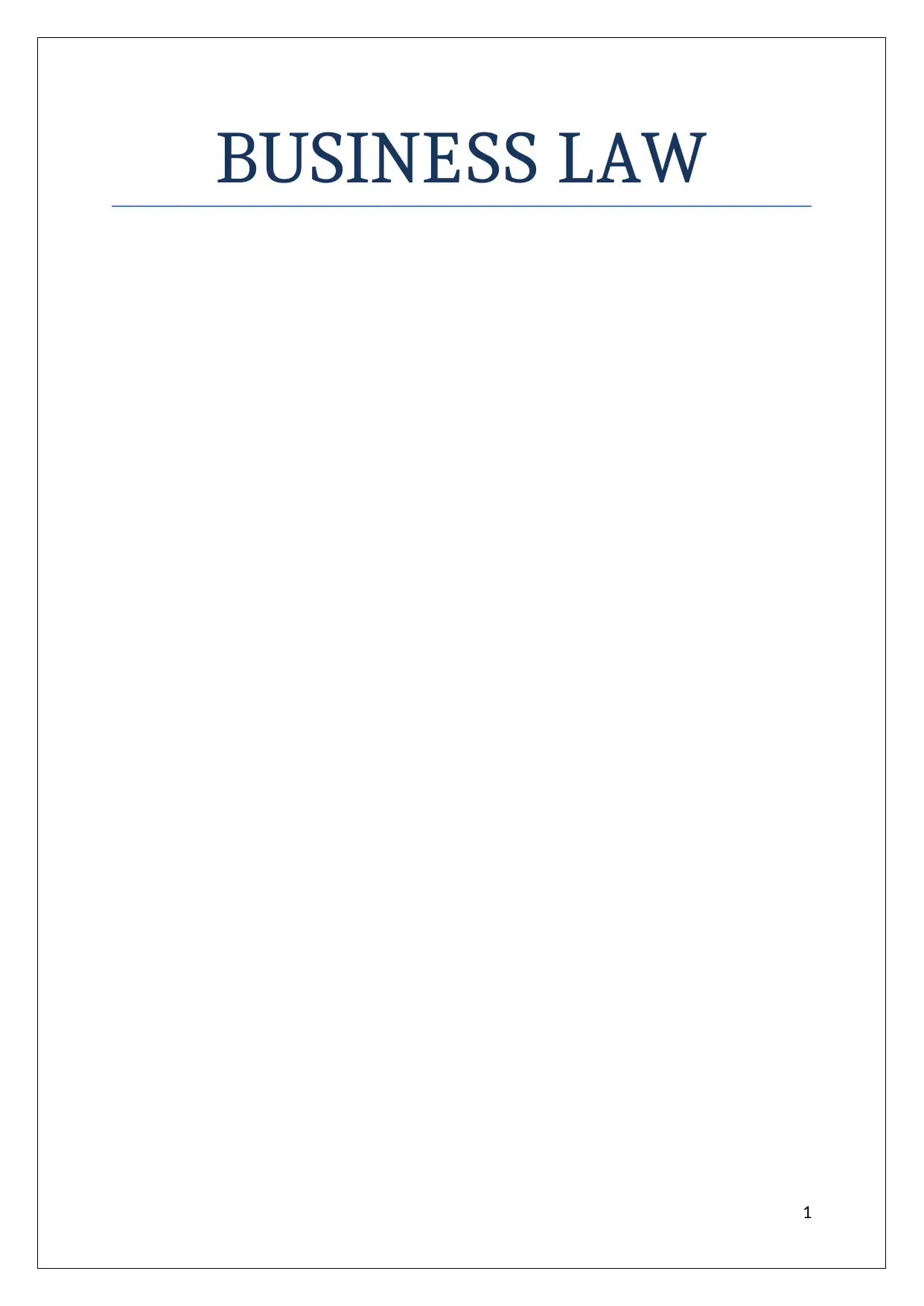
BUSINESS LAW
1
1
Paraphrase This Document
Need a fresh take? Get an instant paraphrase of this document with our AI Paraphraser
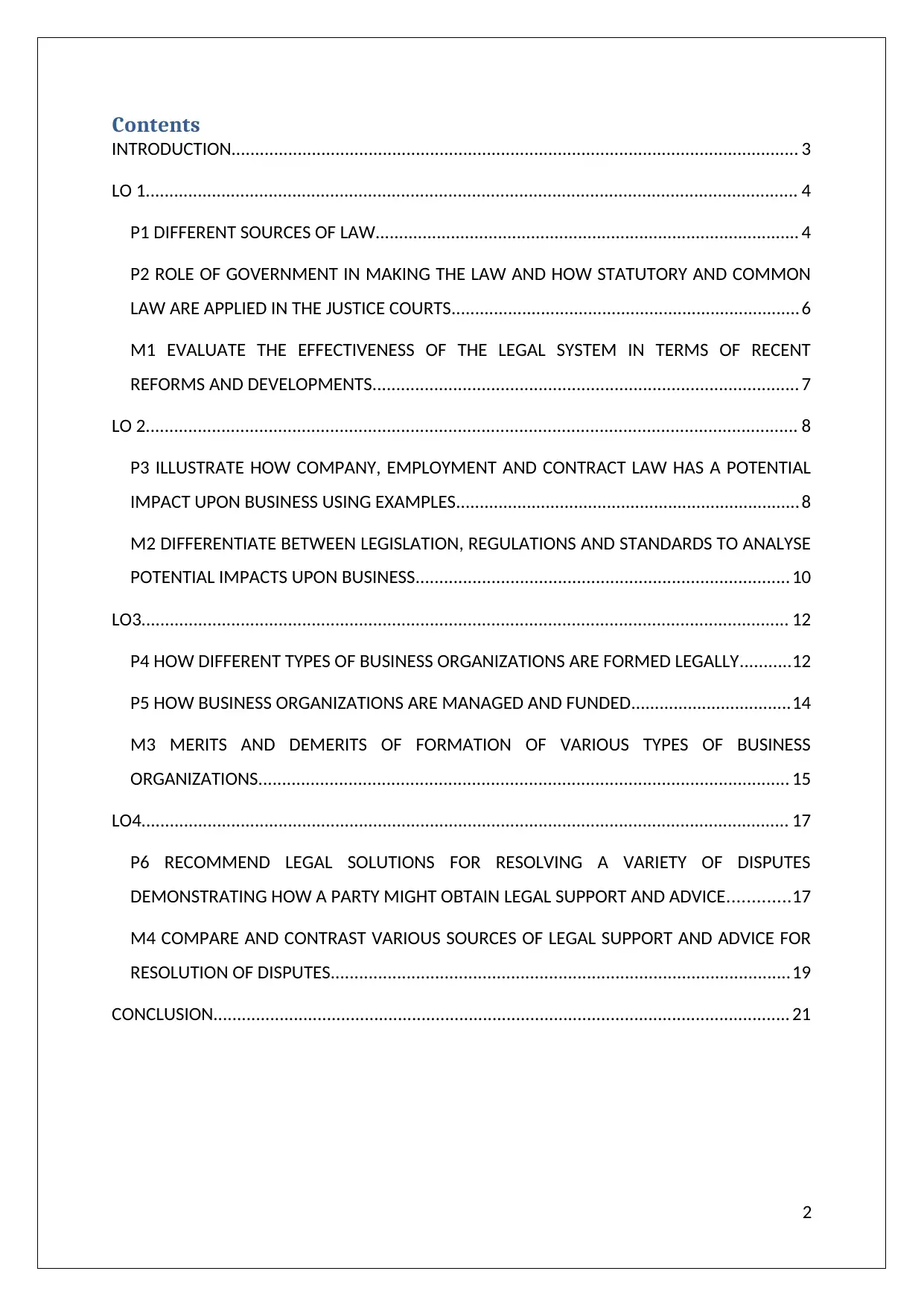
Contents
INTRODUCTION........................................................................................................................ 3
LO 1.......................................................................................................................................... 4
P1 DIFFERENT SOURCES OF LAW.......................................................................................... 4
P2 ROLE OF GOVERNMENT IN MAKING THE LAW AND HOW STATUTORY AND COMMON
LAW ARE APPLIED IN THE JUSTICE COURTS..........................................................................6
M1 EVALUATE THE EFFECTIVENESS OF THE LEGAL SYSTEM IN TERMS OF RECENT
REFORMS AND DEVELOPMENTS.......................................................................................... 7
LO 2.......................................................................................................................................... 8
P3 ILLUSTRATE HOW COMPANY, EMPLOYMENT AND CONTRACT LAW HAS A POTENTIAL
IMPACT UPON BUSINESS USING EXAMPLES......................................................................... 8
M2 DIFFERENTIATE BETWEEN LEGISLATION, REGULATIONS AND STANDARDS TO ANALYSE
POTENTIAL IMPACTS UPON BUSINESS............................................................................... 10
LO3......................................................................................................................................... 12
P4 HOW DIFFERENT TYPES OF BUSINESS ORGANIZATIONS ARE FORMED LEGALLY...........12
P5 HOW BUSINESS ORGANIZATIONS ARE MANAGED AND FUNDED..................................14
M3 MERITS AND DEMERITS OF FORMATION OF VARIOUS TYPES OF BUSINESS
ORGANIZATIONS................................................................................................................ 15
LO4......................................................................................................................................... 17
P6 RECOMMEND LEGAL SOLUTIONS FOR RESOLVING A VARIETY OF DISPUTES
DEMONSTRATING HOW A PARTY MIGHT OBTAIN LEGAL SUPPORT AND ADVICE.............17
M4 COMPARE AND CONTRAST VARIOUS SOURCES OF LEGAL SUPPORT AND ADVICE FOR
RESOLUTION OF DISPUTES.................................................................................................19
CONCLUSION.......................................................................................................................... 21
2
INTRODUCTION........................................................................................................................ 3
LO 1.......................................................................................................................................... 4
P1 DIFFERENT SOURCES OF LAW.......................................................................................... 4
P2 ROLE OF GOVERNMENT IN MAKING THE LAW AND HOW STATUTORY AND COMMON
LAW ARE APPLIED IN THE JUSTICE COURTS..........................................................................6
M1 EVALUATE THE EFFECTIVENESS OF THE LEGAL SYSTEM IN TERMS OF RECENT
REFORMS AND DEVELOPMENTS.......................................................................................... 7
LO 2.......................................................................................................................................... 8
P3 ILLUSTRATE HOW COMPANY, EMPLOYMENT AND CONTRACT LAW HAS A POTENTIAL
IMPACT UPON BUSINESS USING EXAMPLES......................................................................... 8
M2 DIFFERENTIATE BETWEEN LEGISLATION, REGULATIONS AND STANDARDS TO ANALYSE
POTENTIAL IMPACTS UPON BUSINESS............................................................................... 10
LO3......................................................................................................................................... 12
P4 HOW DIFFERENT TYPES OF BUSINESS ORGANIZATIONS ARE FORMED LEGALLY...........12
P5 HOW BUSINESS ORGANIZATIONS ARE MANAGED AND FUNDED..................................14
M3 MERITS AND DEMERITS OF FORMATION OF VARIOUS TYPES OF BUSINESS
ORGANIZATIONS................................................................................................................ 15
LO4......................................................................................................................................... 17
P6 RECOMMEND LEGAL SOLUTIONS FOR RESOLVING A VARIETY OF DISPUTES
DEMONSTRATING HOW A PARTY MIGHT OBTAIN LEGAL SUPPORT AND ADVICE.............17
M4 COMPARE AND CONTRAST VARIOUS SOURCES OF LEGAL SUPPORT AND ADVICE FOR
RESOLUTION OF DISPUTES.................................................................................................19
CONCLUSION.......................................................................................................................... 21
2
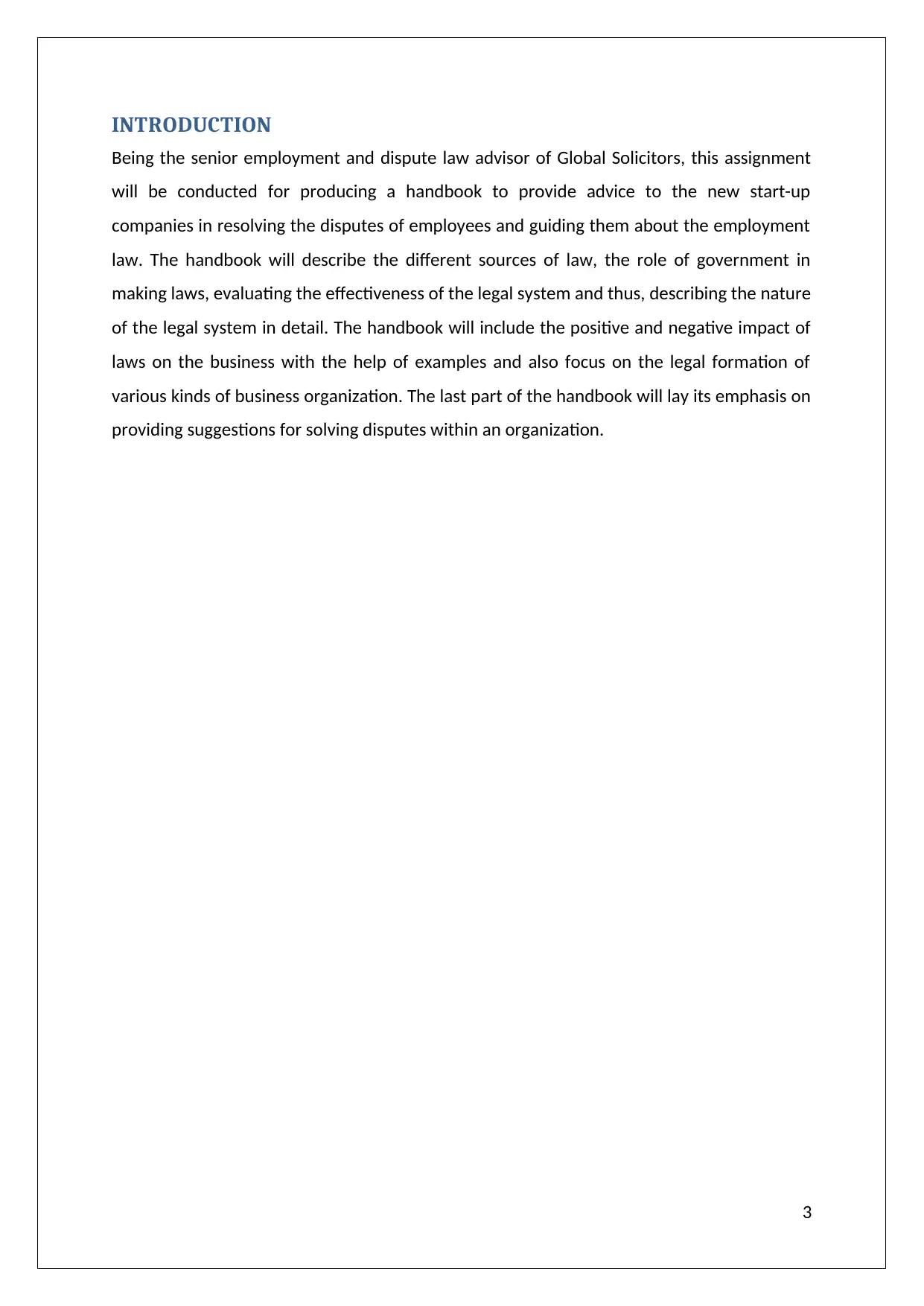
INTRODUCTION
Being the senior employment and dispute law advisor of Global Solicitors, this assignment
will be conducted for producing a handbook to provide advice to the new start-up
companies in resolving the disputes of employees and guiding them about the employment
law. The handbook will describe the different sources of law, the role of government in
making laws, evaluating the effectiveness of the legal system and thus, describing the nature
of the legal system in detail. The handbook will include the positive and negative impact of
laws on the business with the help of examples and also focus on the legal formation of
various kinds of business organization. The last part of the handbook will lay its emphasis on
providing suggestions for solving disputes within an organization.
3
Being the senior employment and dispute law advisor of Global Solicitors, this assignment
will be conducted for producing a handbook to provide advice to the new start-up
companies in resolving the disputes of employees and guiding them about the employment
law. The handbook will describe the different sources of law, the role of government in
making laws, evaluating the effectiveness of the legal system and thus, describing the nature
of the legal system in detail. The handbook will include the positive and negative impact of
laws on the business with the help of examples and also focus on the legal formation of
various kinds of business organization. The last part of the handbook will lay its emphasis on
providing suggestions for solving disputes within an organization.
3
⊘ This is a preview!⊘
Do you want full access?
Subscribe today to unlock all pages.

Trusted by 1+ million students worldwide
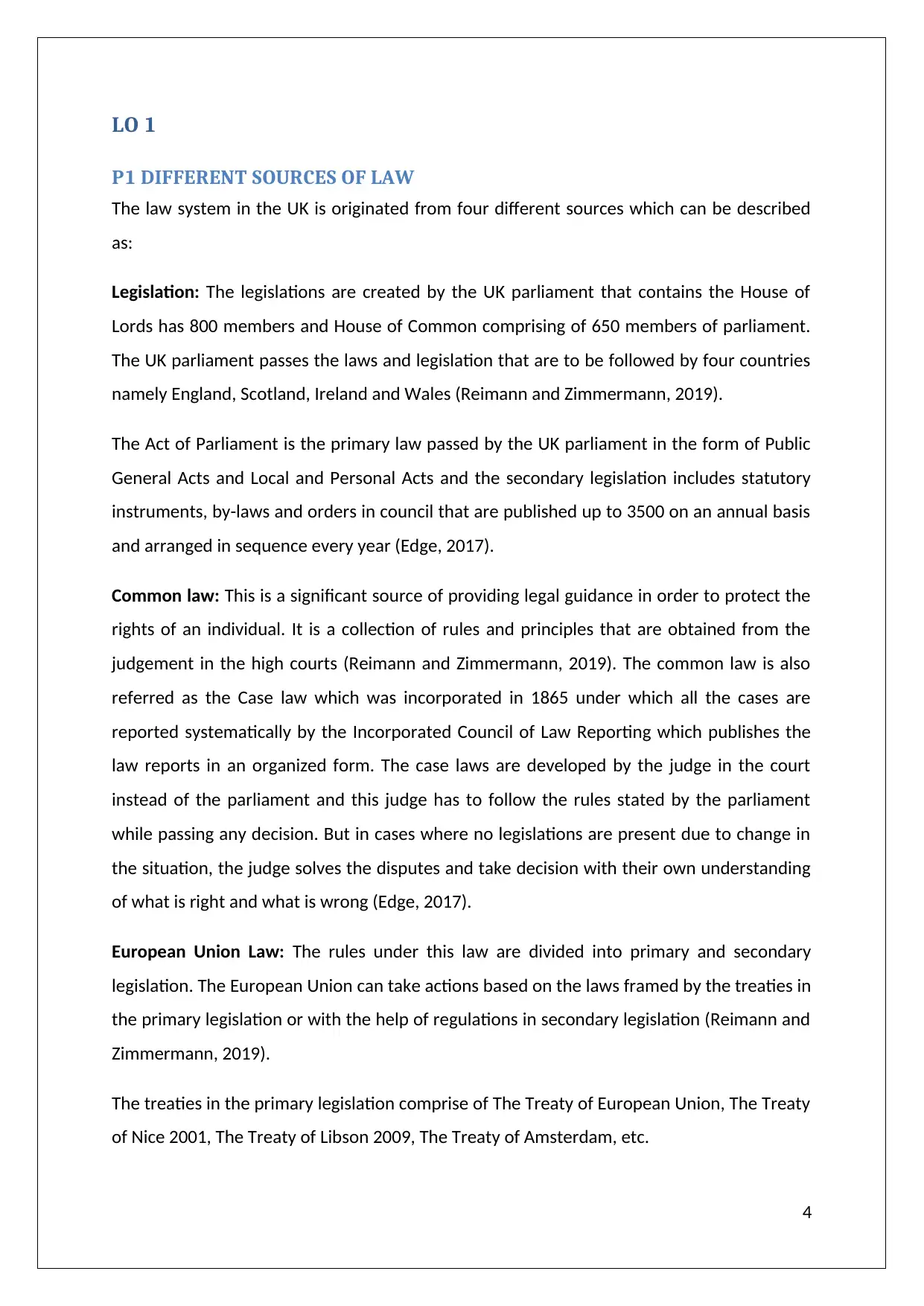
LO 1
P1 DIFFERENT SOURCES OF LAW
The law system in the UK is originated from four different sources which can be described
as:
Legislation: The legislations are created by the UK parliament that contains the House of
Lords has 800 members and House of Common comprising of 650 members of parliament.
The UK parliament passes the laws and legislation that are to be followed by four countries
namely England, Scotland, Ireland and Wales (Reimann and Zimmermann, 2019).
The Act of Parliament is the primary law passed by the UK parliament in the form of Public
General Acts and Local and Personal Acts and the secondary legislation includes statutory
instruments, by-laws and orders in council that are published up to 3500 on an annual basis
and arranged in sequence every year (Edge, 2017).
Common law: This is a significant source of providing legal guidance in order to protect the
rights of an individual. It is a collection of rules and principles that are obtained from the
judgement in the high courts (Reimann and Zimmermann, 2019). The common law is also
referred as the Case law which was incorporated in 1865 under which all the cases are
reported systematically by the Incorporated Council of Law Reporting which publishes the
law reports in an organized form. The case laws are developed by the judge in the court
instead of the parliament and this judge has to follow the rules stated by the parliament
while passing any decision. But in cases where no legislations are present due to change in
the situation, the judge solves the disputes and take decision with their own understanding
of what is right and what is wrong (Edge, 2017).
European Union Law: The rules under this law are divided into primary and secondary
legislation. The European Union can take actions based on the laws framed by the treaties in
the primary legislation or with the help of regulations in secondary legislation (Reimann and
Zimmermann, 2019).
The treaties in the primary legislation comprise of The Treaty of European Union, The Treaty
of Nice 2001, The Treaty of Libson 2009, The Treaty of Amsterdam, etc.
4
P1 DIFFERENT SOURCES OF LAW
The law system in the UK is originated from four different sources which can be described
as:
Legislation: The legislations are created by the UK parliament that contains the House of
Lords has 800 members and House of Common comprising of 650 members of parliament.
The UK parliament passes the laws and legislation that are to be followed by four countries
namely England, Scotland, Ireland and Wales (Reimann and Zimmermann, 2019).
The Act of Parliament is the primary law passed by the UK parliament in the form of Public
General Acts and Local and Personal Acts and the secondary legislation includes statutory
instruments, by-laws and orders in council that are published up to 3500 on an annual basis
and arranged in sequence every year (Edge, 2017).
Common law: This is a significant source of providing legal guidance in order to protect the
rights of an individual. It is a collection of rules and principles that are obtained from the
judgement in the high courts (Reimann and Zimmermann, 2019). The common law is also
referred as the Case law which was incorporated in 1865 under which all the cases are
reported systematically by the Incorporated Council of Law Reporting which publishes the
law reports in an organized form. The case laws are developed by the judge in the court
instead of the parliament and this judge has to follow the rules stated by the parliament
while passing any decision. But in cases where no legislations are present due to change in
the situation, the judge solves the disputes and take decision with their own understanding
of what is right and what is wrong (Edge, 2017).
European Union Law: The rules under this law are divided into primary and secondary
legislation. The European Union can take actions based on the laws framed by the treaties in
the primary legislation or with the help of regulations in secondary legislation (Reimann and
Zimmermann, 2019).
The treaties in the primary legislation comprise of The Treaty of European Union, The Treaty
of Nice 2001, The Treaty of Libson 2009, The Treaty of Amsterdam, etc.
4
Paraphrase This Document
Need a fresh take? Get an instant paraphrase of this document with our AI Paraphraser
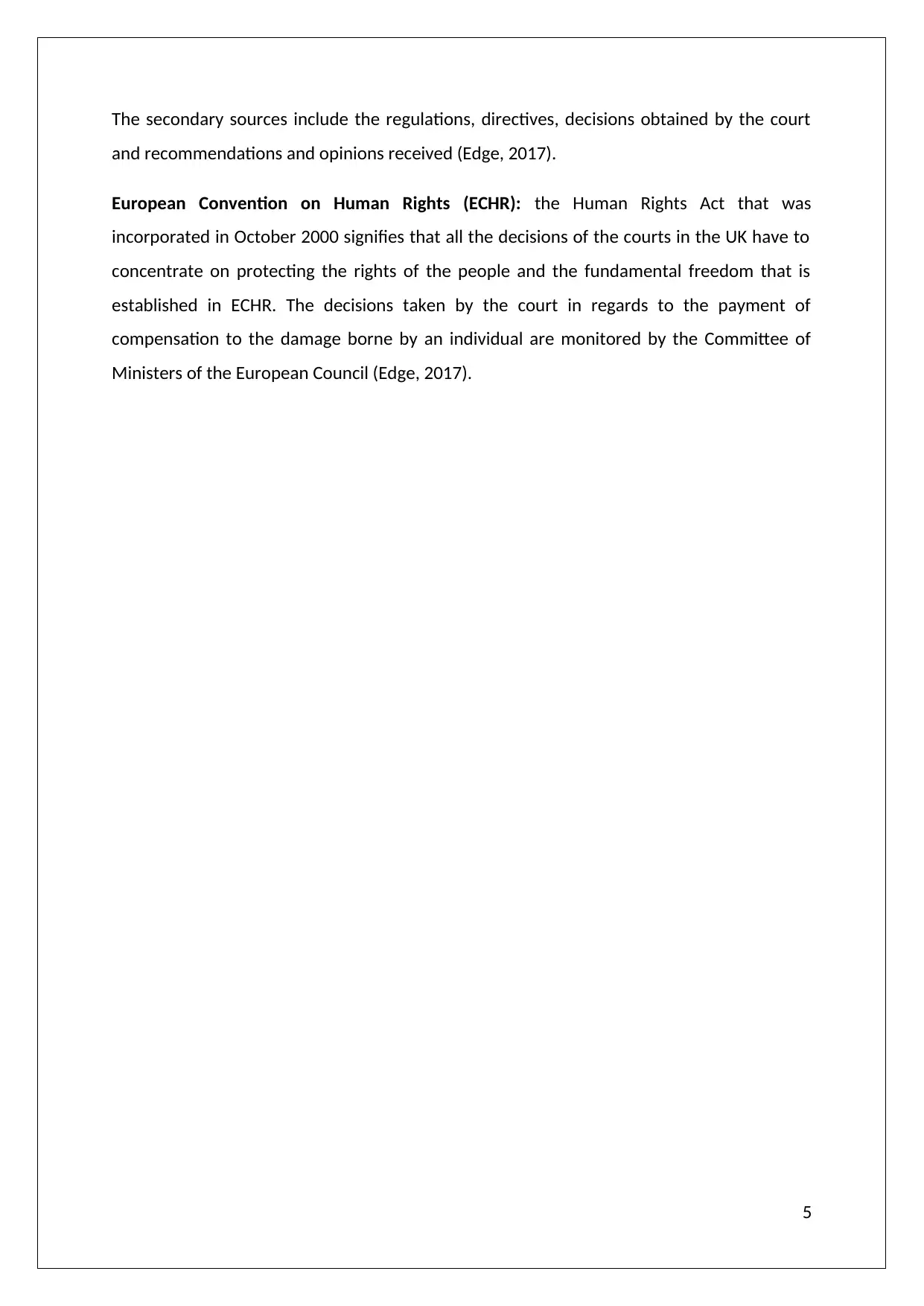
The secondary sources include the regulations, directives, decisions obtained by the court
and recommendations and opinions received (Edge, 2017).
European Convention on Human Rights (ECHR): the Human Rights Act that was
incorporated in October 2000 signifies that all the decisions of the courts in the UK have to
concentrate on protecting the rights of the people and the fundamental freedom that is
established in ECHR. The decisions taken by the court in regards to the payment of
compensation to the damage borne by an individual are monitored by the Committee of
Ministers of the European Council (Edge, 2017).
5
and recommendations and opinions received (Edge, 2017).
European Convention on Human Rights (ECHR): the Human Rights Act that was
incorporated in October 2000 signifies that all the decisions of the courts in the UK have to
concentrate on protecting the rights of the people and the fundamental freedom that is
established in ECHR. The decisions taken by the court in regards to the payment of
compensation to the damage borne by an individual are monitored by the Committee of
Ministers of the European Council (Edge, 2017).
5
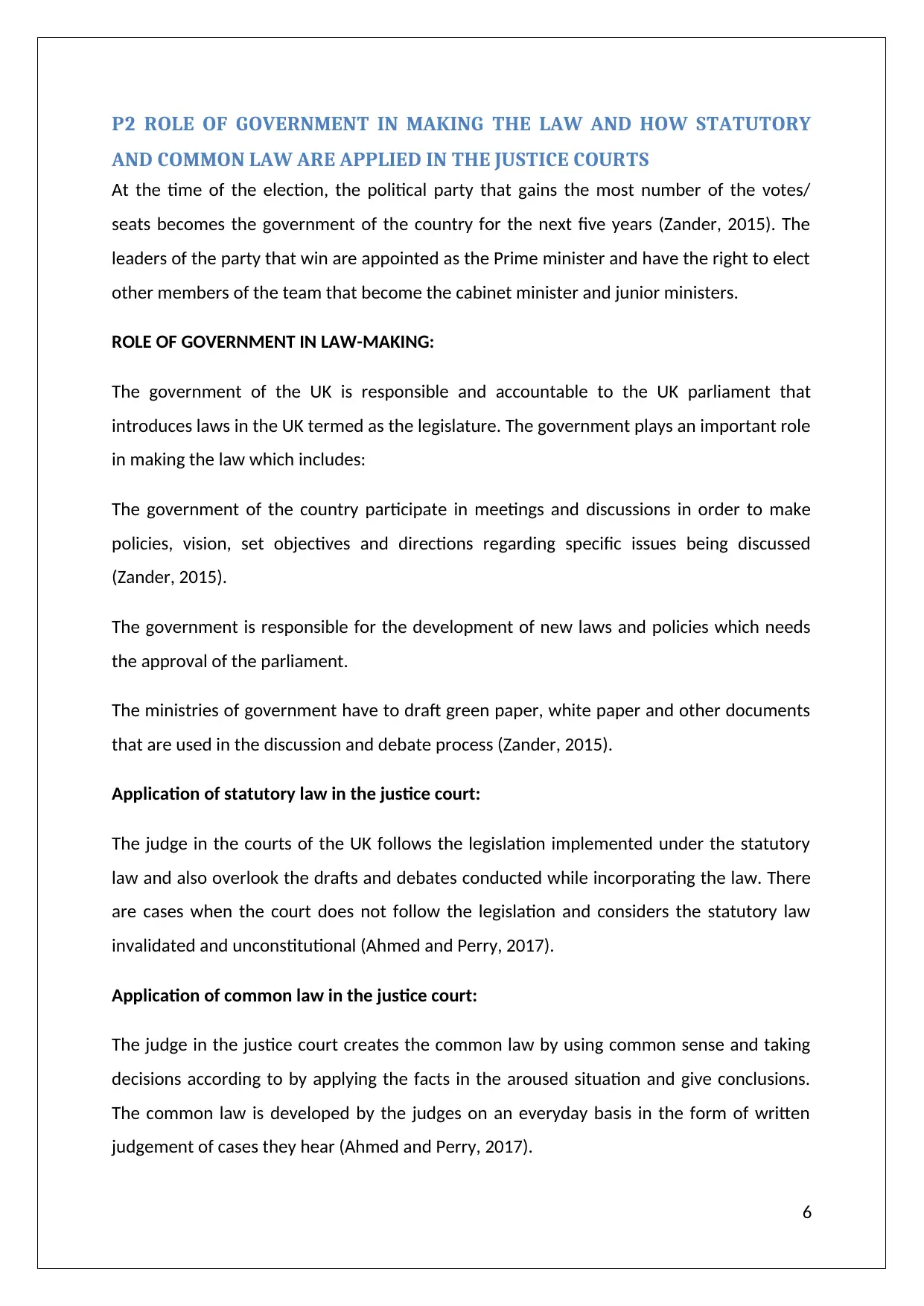
P2 ROLE OF GOVERNMENT IN MAKING THE LAW AND HOW STATUTORY
AND COMMON LAW ARE APPLIED IN THE JUSTICE COURTS
At the time of the election, the political party that gains the most number of the votes/
seats becomes the government of the country for the next five years (Zander, 2015). The
leaders of the party that win are appointed as the Prime minister and have the right to elect
other members of the team that become the cabinet minister and junior ministers.
ROLE OF GOVERNMENT IN LAW-MAKING:
The government of the UK is responsible and accountable to the UK parliament that
introduces laws in the UK termed as the legislature. The government plays an important role
in making the law which includes:
The government of the country participate in meetings and discussions in order to make
policies, vision, set objectives and directions regarding specific issues being discussed
(Zander, 2015).
The government is responsible for the development of new laws and policies which needs
the approval of the parliament.
The ministries of government have to draft green paper, white paper and other documents
that are used in the discussion and debate process (Zander, 2015).
Application of statutory law in the justice court:
The judge in the courts of the UK follows the legislation implemented under the statutory
law and also overlook the drafts and debates conducted while incorporating the law. There
are cases when the court does not follow the legislation and considers the statutory law
invalidated and unconstitutional (Ahmed and Perry, 2017).
Application of common law in the justice court:
The judge in the justice court creates the common law by using common sense and taking
decisions according to by applying the facts in the aroused situation and give conclusions.
The common law is developed by the judges on an everyday basis in the form of written
judgement of cases they hear (Ahmed and Perry, 2017).
6
AND COMMON LAW ARE APPLIED IN THE JUSTICE COURTS
At the time of the election, the political party that gains the most number of the votes/
seats becomes the government of the country for the next five years (Zander, 2015). The
leaders of the party that win are appointed as the Prime minister and have the right to elect
other members of the team that become the cabinet minister and junior ministers.
ROLE OF GOVERNMENT IN LAW-MAKING:
The government of the UK is responsible and accountable to the UK parliament that
introduces laws in the UK termed as the legislature. The government plays an important role
in making the law which includes:
The government of the country participate in meetings and discussions in order to make
policies, vision, set objectives and directions regarding specific issues being discussed
(Zander, 2015).
The government is responsible for the development of new laws and policies which needs
the approval of the parliament.
The ministries of government have to draft green paper, white paper and other documents
that are used in the discussion and debate process (Zander, 2015).
Application of statutory law in the justice court:
The judge in the courts of the UK follows the legislation implemented under the statutory
law and also overlook the drafts and debates conducted while incorporating the law. There
are cases when the court does not follow the legislation and considers the statutory law
invalidated and unconstitutional (Ahmed and Perry, 2017).
Application of common law in the justice court:
The judge in the justice court creates the common law by using common sense and taking
decisions according to by applying the facts in the aroused situation and give conclusions.
The common law is developed by the judges on an everyday basis in the form of written
judgement of cases they hear (Ahmed and Perry, 2017).
6
⊘ This is a preview!⊘
Do you want full access?
Subscribe today to unlock all pages.

Trusted by 1+ million students worldwide
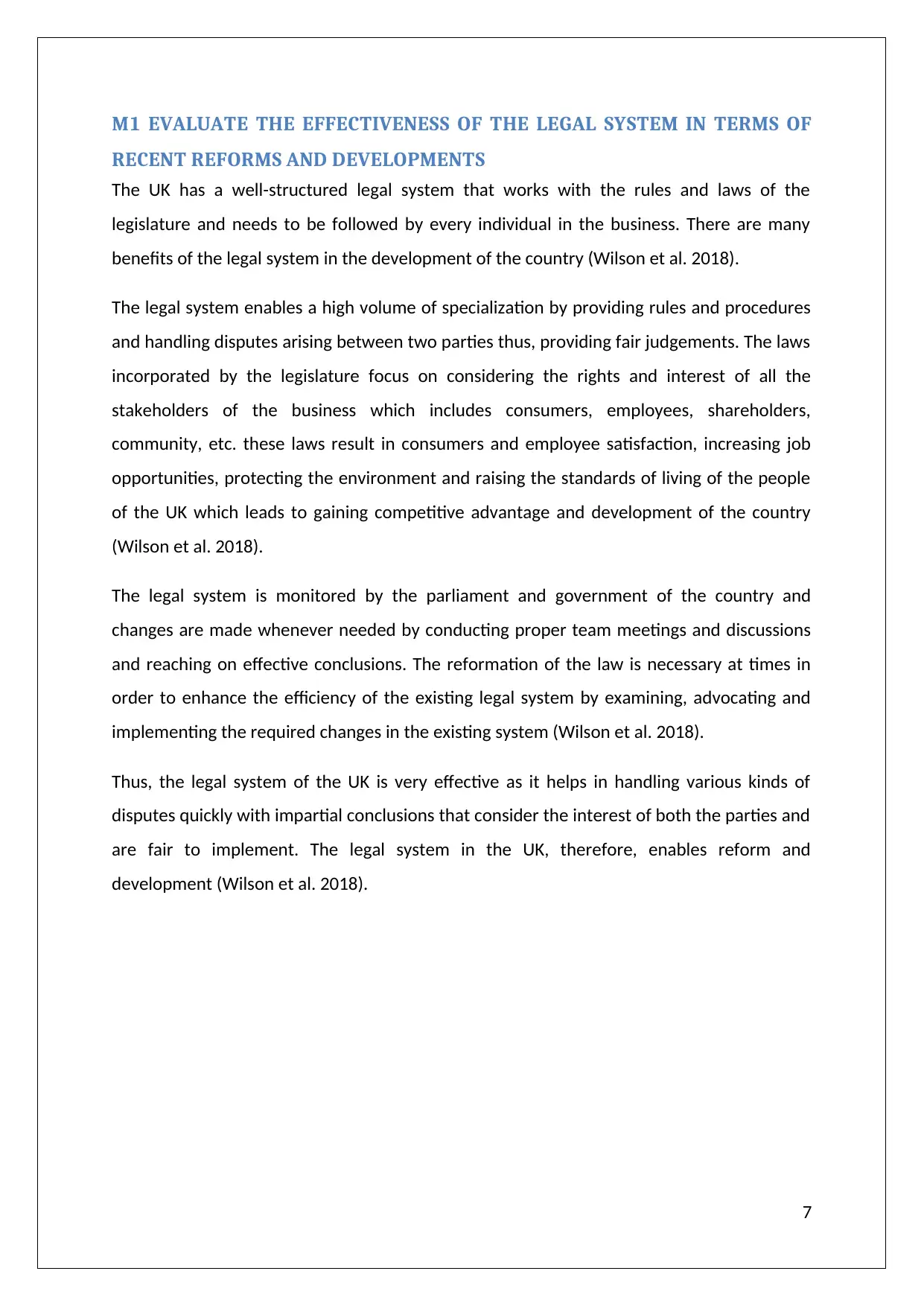
M1 EVALUATE THE EFFECTIVENESS OF THE LEGAL SYSTEM IN TERMS OF
RECENT REFORMS AND DEVELOPMENTS
The UK has a well-structured legal system that works with the rules and laws of the
legislature and needs to be followed by every individual in the business. There are many
benefits of the legal system in the development of the country (Wilson et al. 2018).
The legal system enables a high volume of specialization by providing rules and procedures
and handling disputes arising between two parties thus, providing fair judgements. The laws
incorporated by the legislature focus on considering the rights and interest of all the
stakeholders of the business which includes consumers, employees, shareholders,
community, etc. these laws result in consumers and employee satisfaction, increasing job
opportunities, protecting the environment and raising the standards of living of the people
of the UK which leads to gaining competitive advantage and development of the country
(Wilson et al. 2018).
The legal system is monitored by the parliament and government of the country and
changes are made whenever needed by conducting proper team meetings and discussions
and reaching on effective conclusions. The reformation of the law is necessary at times in
order to enhance the efficiency of the existing legal system by examining, advocating and
implementing the required changes in the existing system (Wilson et al. 2018).
Thus, the legal system of the UK is very effective as it helps in handling various kinds of
disputes quickly with impartial conclusions that consider the interest of both the parties and
are fair to implement. The legal system in the UK, therefore, enables reform and
development (Wilson et al. 2018).
7
RECENT REFORMS AND DEVELOPMENTS
The UK has a well-structured legal system that works with the rules and laws of the
legislature and needs to be followed by every individual in the business. There are many
benefits of the legal system in the development of the country (Wilson et al. 2018).
The legal system enables a high volume of specialization by providing rules and procedures
and handling disputes arising between two parties thus, providing fair judgements. The laws
incorporated by the legislature focus on considering the rights and interest of all the
stakeholders of the business which includes consumers, employees, shareholders,
community, etc. these laws result in consumers and employee satisfaction, increasing job
opportunities, protecting the environment and raising the standards of living of the people
of the UK which leads to gaining competitive advantage and development of the country
(Wilson et al. 2018).
The legal system is monitored by the parliament and government of the country and
changes are made whenever needed by conducting proper team meetings and discussions
and reaching on effective conclusions. The reformation of the law is necessary at times in
order to enhance the efficiency of the existing legal system by examining, advocating and
implementing the required changes in the existing system (Wilson et al. 2018).
Thus, the legal system of the UK is very effective as it helps in handling various kinds of
disputes quickly with impartial conclusions that consider the interest of both the parties and
are fair to implement. The legal system in the UK, therefore, enables reform and
development (Wilson et al. 2018).
7
Paraphrase This Document
Need a fresh take? Get an instant paraphrase of this document with our AI Paraphraser
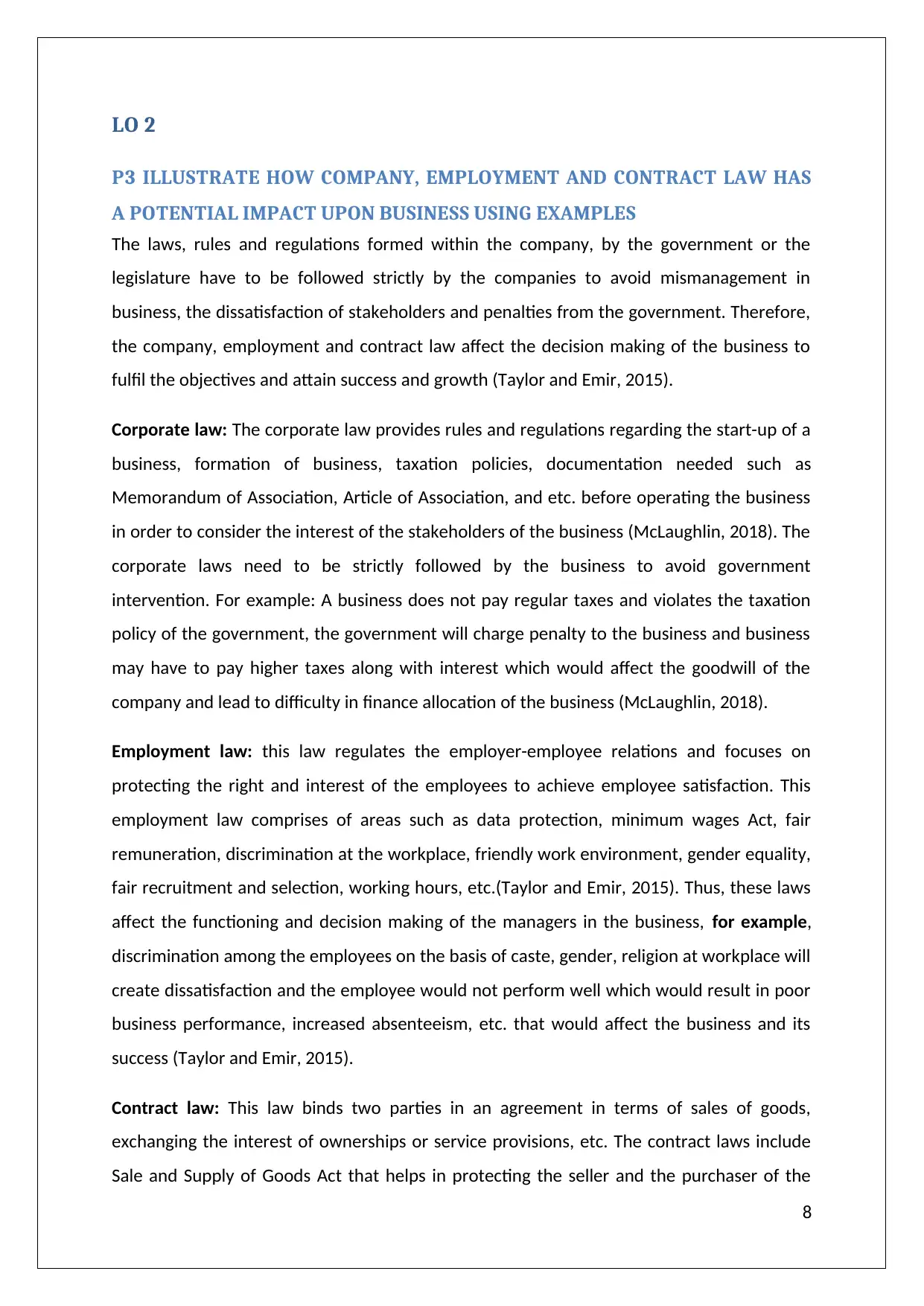
LO 2
P3 ILLUSTRATE HOW COMPANY, EMPLOYMENT AND CONTRACT LAW HAS
A POTENTIAL IMPACT UPON BUSINESS USING EXAMPLES
The laws, rules and regulations formed within the company, by the government or the
legislature have to be followed strictly by the companies to avoid mismanagement in
business, the dissatisfaction of stakeholders and penalties from the government. Therefore,
the company, employment and contract law affect the decision making of the business to
fulfil the objectives and attain success and growth (Taylor and Emir, 2015).
Corporate law: The corporate law provides rules and regulations regarding the start-up of a
business, formation of business, taxation policies, documentation needed such as
Memorandum of Association, Article of Association, and etc. before operating the business
in order to consider the interest of the stakeholders of the business (McLaughlin, 2018). The
corporate laws need to be strictly followed by the business to avoid government
intervention. For example: A business does not pay regular taxes and violates the taxation
policy of the government, the government will charge penalty to the business and business
may have to pay higher taxes along with interest which would affect the goodwill of the
company and lead to difficulty in finance allocation of the business (McLaughlin, 2018).
Employment law: this law regulates the employer-employee relations and focuses on
protecting the right and interest of the employees to achieve employee satisfaction. This
employment law comprises of areas such as data protection, minimum wages Act, fair
remuneration, discrimination at the workplace, friendly work environment, gender equality,
fair recruitment and selection, working hours, etc.(Taylor and Emir, 2015). Thus, these laws
affect the functioning and decision making of the managers in the business, for example,
discrimination among the employees on the basis of caste, gender, religion at workplace will
create dissatisfaction and the employee would not perform well which would result in poor
business performance, increased absenteeism, etc. that would affect the business and its
success (Taylor and Emir, 2015).
Contract law: This law binds two parties in an agreement in terms of sales of goods,
exchanging the interest of ownerships or service provisions, etc. The contract laws include
Sale and Supply of Goods Act that helps in protecting the seller and the purchaser of the
8
P3 ILLUSTRATE HOW COMPANY, EMPLOYMENT AND CONTRACT LAW HAS
A POTENTIAL IMPACT UPON BUSINESS USING EXAMPLES
The laws, rules and regulations formed within the company, by the government or the
legislature have to be followed strictly by the companies to avoid mismanagement in
business, the dissatisfaction of stakeholders and penalties from the government. Therefore,
the company, employment and contract law affect the decision making of the business to
fulfil the objectives and attain success and growth (Taylor and Emir, 2015).
Corporate law: The corporate law provides rules and regulations regarding the start-up of a
business, formation of business, taxation policies, documentation needed such as
Memorandum of Association, Article of Association, and etc. before operating the business
in order to consider the interest of the stakeholders of the business (McLaughlin, 2018). The
corporate laws need to be strictly followed by the business to avoid government
intervention. For example: A business does not pay regular taxes and violates the taxation
policy of the government, the government will charge penalty to the business and business
may have to pay higher taxes along with interest which would affect the goodwill of the
company and lead to difficulty in finance allocation of the business (McLaughlin, 2018).
Employment law: this law regulates the employer-employee relations and focuses on
protecting the right and interest of the employees to achieve employee satisfaction. This
employment law comprises of areas such as data protection, minimum wages Act, fair
remuneration, discrimination at the workplace, friendly work environment, gender equality,
fair recruitment and selection, working hours, etc.(Taylor and Emir, 2015). Thus, these laws
affect the functioning and decision making of the managers in the business, for example,
discrimination among the employees on the basis of caste, gender, religion at workplace will
create dissatisfaction and the employee would not perform well which would result in poor
business performance, increased absenteeism, etc. that would affect the business and its
success (Taylor and Emir, 2015).
Contract law: This law binds two parties in an agreement in terms of sales of goods,
exchanging the interest of ownerships or service provisions, etc. The contract laws include
Sale and Supply of Goods Act that helps in protecting the seller and the purchaser of the
8
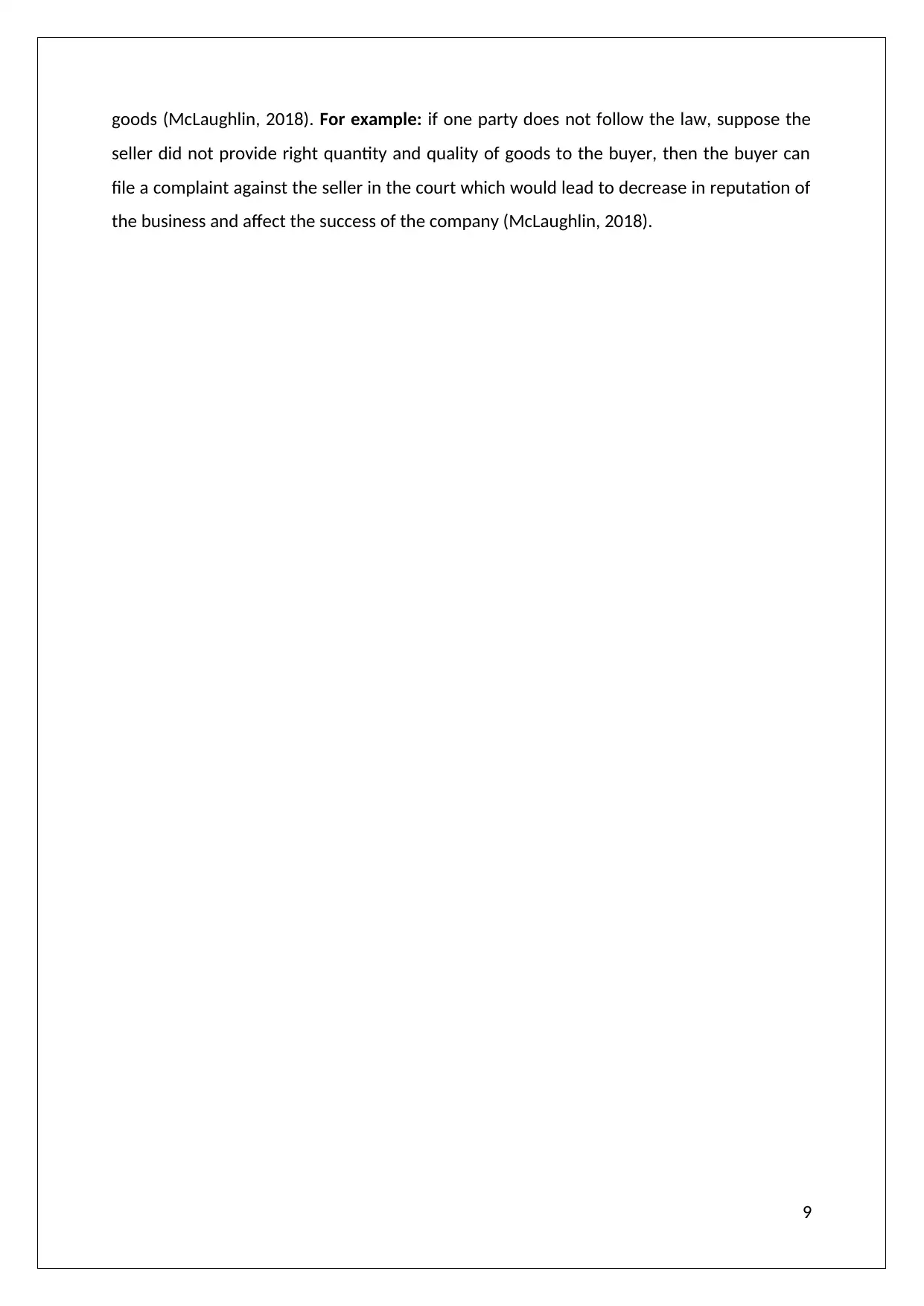
goods (McLaughlin, 2018). For example: if one party does not follow the law, suppose the
seller did not provide right quantity and quality of goods to the buyer, then the buyer can
file a complaint against the seller in the court which would lead to decrease in reputation of
the business and affect the success of the company (McLaughlin, 2018).
9
seller did not provide right quantity and quality of goods to the buyer, then the buyer can
file a complaint against the seller in the court which would lead to decrease in reputation of
the business and affect the success of the company (McLaughlin, 2018).
9
⊘ This is a preview!⊘
Do you want full access?
Subscribe today to unlock all pages.

Trusted by 1+ million students worldwide
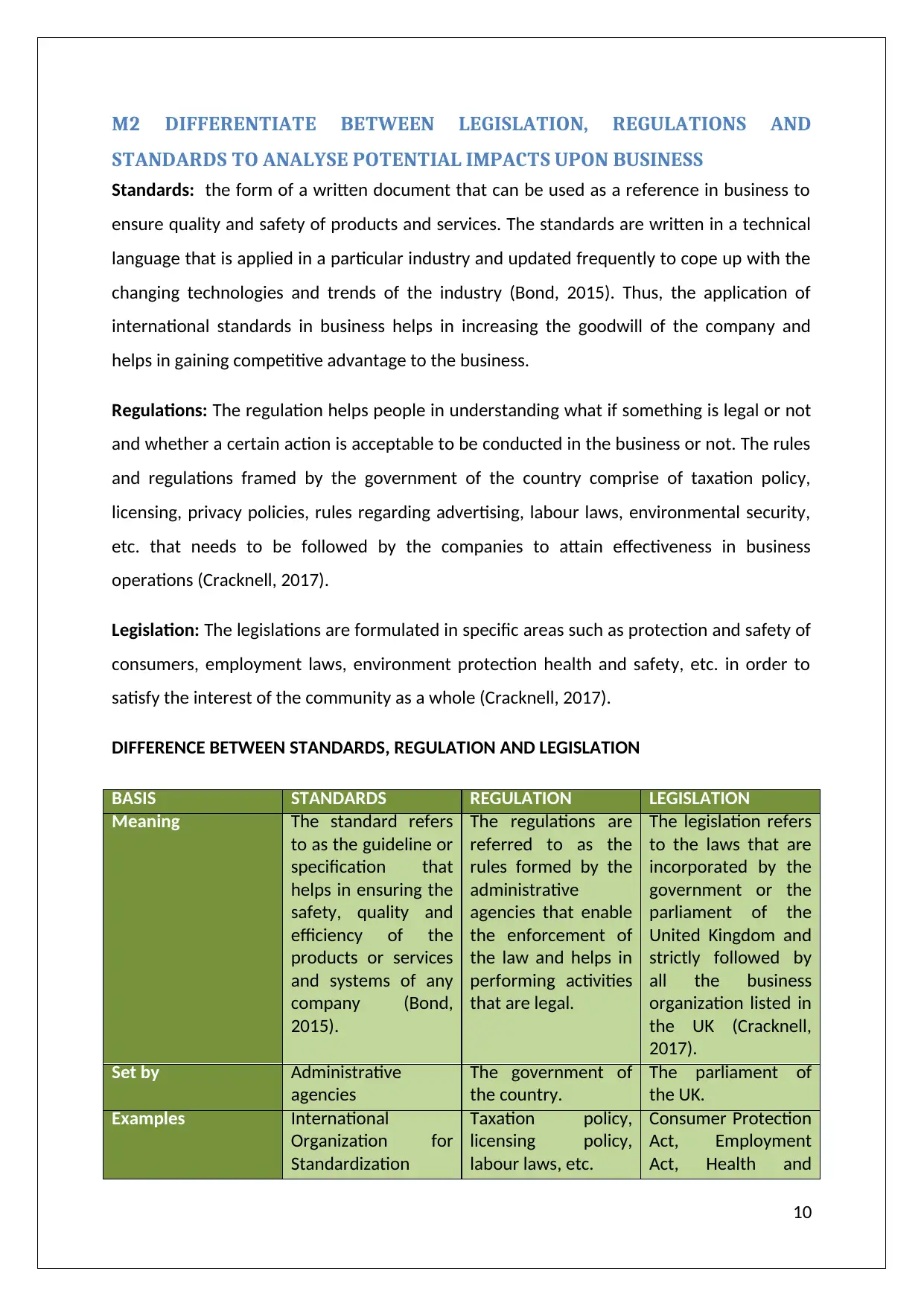
M2 DIFFERENTIATE BETWEEN LEGISLATION, REGULATIONS AND
STANDARDS TO ANALYSE POTENTIAL IMPACTS UPON BUSINESS
Standards: the form of a written document that can be used as a reference in business to
ensure quality and safety of products and services. The standards are written in a technical
language that is applied in a particular industry and updated frequently to cope up with the
changing technologies and trends of the industry (Bond, 2015). Thus, the application of
international standards in business helps in increasing the goodwill of the company and
helps in gaining competitive advantage to the business.
Regulations: The regulation helps people in understanding what if something is legal or not
and whether a certain action is acceptable to be conducted in the business or not. The rules
and regulations framed by the government of the country comprise of taxation policy,
licensing, privacy policies, rules regarding advertising, labour laws, environmental security,
etc. that needs to be followed by the companies to attain effectiveness in business
operations (Cracknell, 2017).
Legislation: The legislations are formulated in specific areas such as protection and safety of
consumers, employment laws, environment protection health and safety, etc. in order to
satisfy the interest of the community as a whole (Cracknell, 2017).
DIFFERENCE BETWEEN STANDARDS, REGULATION AND LEGISLATION
BASIS STANDARDS REGULATION LEGISLATION
Meaning The standard refers
to as the guideline or
specification that
helps in ensuring the
safety, quality and
efficiency of the
products or services
and systems of any
company (Bond,
2015).
The regulations are
referred to as the
rules formed by the
administrative
agencies that enable
the enforcement of
the law and helps in
performing activities
that are legal.
The legislation refers
to the laws that are
incorporated by the
government or the
parliament of the
United Kingdom and
strictly followed by
all the business
organization listed in
the UK (Cracknell,
2017).
Set by Administrative
agencies
The government of
the country.
The parliament of
the UK.
Examples International
Organization for
Standardization
Taxation policy,
licensing policy,
labour laws, etc.
Consumer Protection
Act, Employment
Act, Health and
10
STANDARDS TO ANALYSE POTENTIAL IMPACTS UPON BUSINESS
Standards: the form of a written document that can be used as a reference in business to
ensure quality and safety of products and services. The standards are written in a technical
language that is applied in a particular industry and updated frequently to cope up with the
changing technologies and trends of the industry (Bond, 2015). Thus, the application of
international standards in business helps in increasing the goodwill of the company and
helps in gaining competitive advantage to the business.
Regulations: The regulation helps people in understanding what if something is legal or not
and whether a certain action is acceptable to be conducted in the business or not. The rules
and regulations framed by the government of the country comprise of taxation policy,
licensing, privacy policies, rules regarding advertising, labour laws, environmental security,
etc. that needs to be followed by the companies to attain effectiveness in business
operations (Cracknell, 2017).
Legislation: The legislations are formulated in specific areas such as protection and safety of
consumers, employment laws, environment protection health and safety, etc. in order to
satisfy the interest of the community as a whole (Cracknell, 2017).
DIFFERENCE BETWEEN STANDARDS, REGULATION AND LEGISLATION
BASIS STANDARDS REGULATION LEGISLATION
Meaning The standard refers
to as the guideline or
specification that
helps in ensuring the
safety, quality and
efficiency of the
products or services
and systems of any
company (Bond,
2015).
The regulations are
referred to as the
rules formed by the
administrative
agencies that enable
the enforcement of
the law and helps in
performing activities
that are legal.
The legislation refers
to the laws that are
incorporated by the
government or the
parliament of the
United Kingdom and
strictly followed by
all the business
organization listed in
the UK (Cracknell,
2017).
Set by Administrative
agencies
The government of
the country.
The parliament of
the UK.
Examples International
Organization for
Standardization
Taxation policy,
licensing policy,
labour laws, etc.
Consumer Protection
Act, Employment
Act, Health and
10
Paraphrase This Document
Need a fresh take? Get an instant paraphrase of this document with our AI Paraphraser
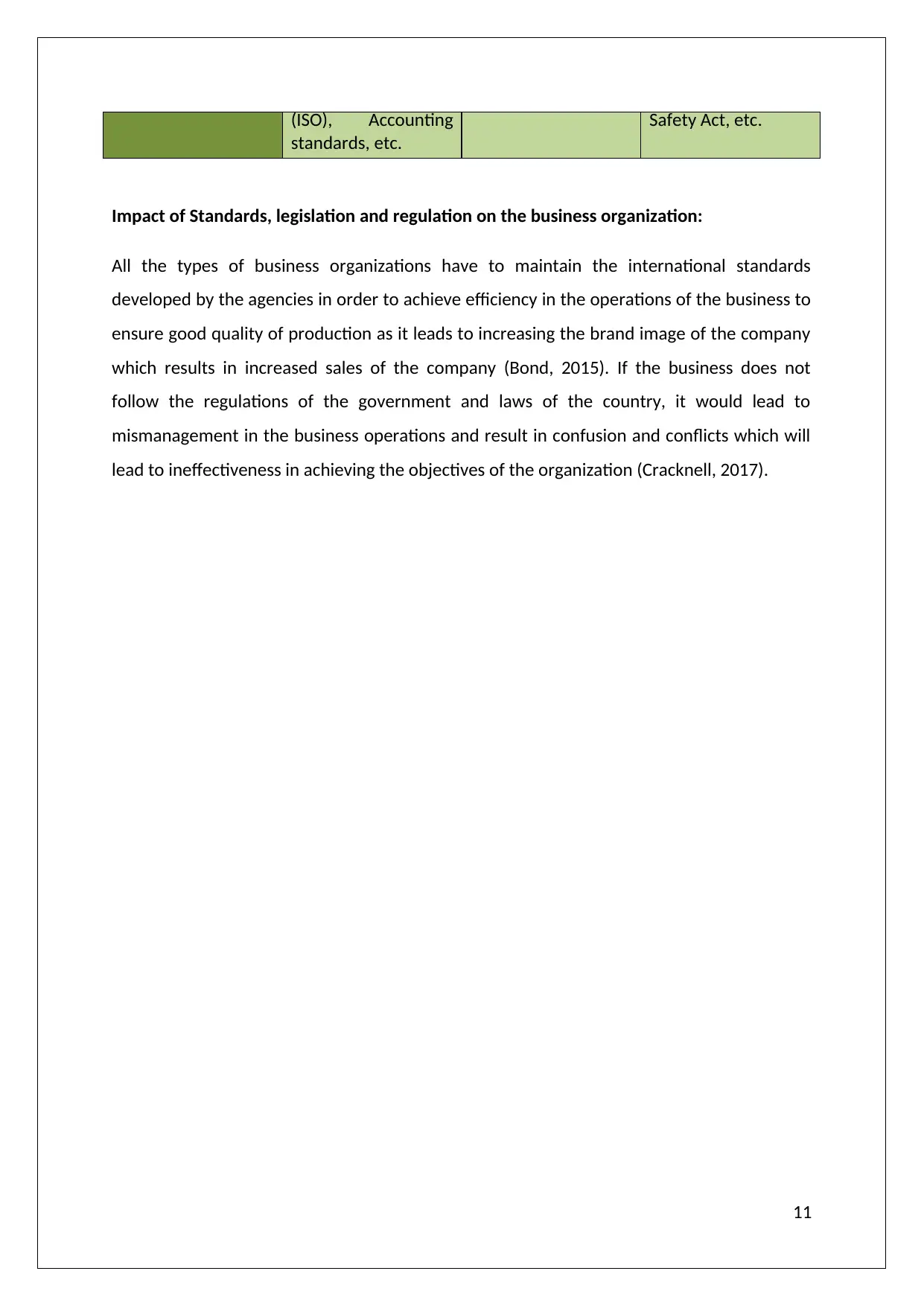
(ISO), Accounting
standards, etc.
Safety Act, etc.
Impact of Standards, legislation and regulation on the business organization:
All the types of business organizations have to maintain the international standards
developed by the agencies in order to achieve efficiency in the operations of the business to
ensure good quality of production as it leads to increasing the brand image of the company
which results in increased sales of the company (Bond, 2015). If the business does not
follow the regulations of the government and laws of the country, it would lead to
mismanagement in the business operations and result in confusion and conflicts which will
lead to ineffectiveness in achieving the objectives of the organization (Cracknell, 2017).
11
standards, etc.
Safety Act, etc.
Impact of Standards, legislation and regulation on the business organization:
All the types of business organizations have to maintain the international standards
developed by the agencies in order to achieve efficiency in the operations of the business to
ensure good quality of production as it leads to increasing the brand image of the company
which results in increased sales of the company (Bond, 2015). If the business does not
follow the regulations of the government and laws of the country, it would lead to
mismanagement in the business operations and result in confusion and conflicts which will
lead to ineffectiveness in achieving the objectives of the organization (Cracknell, 2017).
11
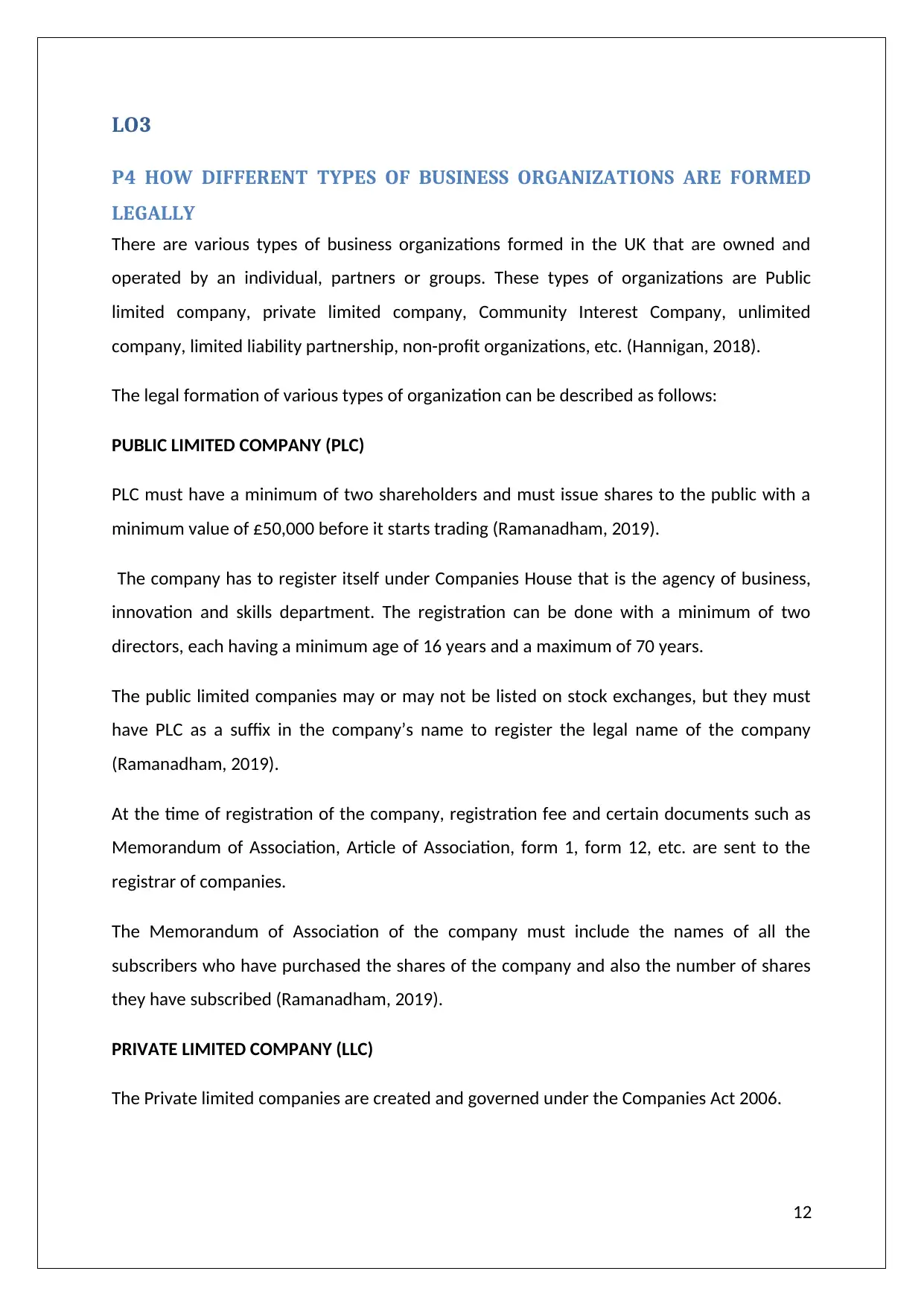
LO3
P4 HOW DIFFERENT TYPES OF BUSINESS ORGANIZATIONS ARE FORMED
LEGALLY
There are various types of business organizations formed in the UK that are owned and
operated by an individual, partners or groups. These types of organizations are Public
limited company, private limited company, Community Interest Company, unlimited
company, limited liability partnership, non-profit organizations, etc. (Hannigan, 2018).
The legal formation of various types of organization can be described as follows:
PUBLIC LIMITED COMPANY (PLC)
PLC must have a minimum of two shareholders and must issue shares to the public with a
minimum value of £50,000 before it starts trading (Ramanadham, 2019).
The company has to register itself under Companies House that is the agency of business,
innovation and skills department. The registration can be done with a minimum of two
directors, each having a minimum age of 16 years and a maximum of 70 years.
The public limited companies may or may not be listed on stock exchanges, but they must
have PLC as a suffix in the company’s name to register the legal name of the company
(Ramanadham, 2019).
At the time of registration of the company, registration fee and certain documents such as
Memorandum of Association, Article of Association, form 1, form 12, etc. are sent to the
registrar of companies.
The Memorandum of Association of the company must include the names of all the
subscribers who have purchased the shares of the company and also the number of shares
they have subscribed (Ramanadham, 2019).
PRIVATE LIMITED COMPANY (LLC)
The Private limited companies are created and governed under the Companies Act 2006.
12
P4 HOW DIFFERENT TYPES OF BUSINESS ORGANIZATIONS ARE FORMED
LEGALLY
There are various types of business organizations formed in the UK that are owned and
operated by an individual, partners or groups. These types of organizations are Public
limited company, private limited company, Community Interest Company, unlimited
company, limited liability partnership, non-profit organizations, etc. (Hannigan, 2018).
The legal formation of various types of organization can be described as follows:
PUBLIC LIMITED COMPANY (PLC)
PLC must have a minimum of two shareholders and must issue shares to the public with a
minimum value of £50,000 before it starts trading (Ramanadham, 2019).
The company has to register itself under Companies House that is the agency of business,
innovation and skills department. The registration can be done with a minimum of two
directors, each having a minimum age of 16 years and a maximum of 70 years.
The public limited companies may or may not be listed on stock exchanges, but they must
have PLC as a suffix in the company’s name to register the legal name of the company
(Ramanadham, 2019).
At the time of registration of the company, registration fee and certain documents such as
Memorandum of Association, Article of Association, form 1, form 12, etc. are sent to the
registrar of companies.
The Memorandum of Association of the company must include the names of all the
subscribers who have purchased the shares of the company and also the number of shares
they have subscribed (Ramanadham, 2019).
PRIVATE LIMITED COMPANY (LLC)
The Private limited companies are created and governed under the Companies Act 2006.
12
⊘ This is a preview!⊘
Do you want full access?
Subscribe today to unlock all pages.

Trusted by 1+ million students worldwide
1 out of 23
Related Documents
Your All-in-One AI-Powered Toolkit for Academic Success.
+13062052269
info@desklib.com
Available 24*7 on WhatsApp / Email
![[object Object]](/_next/static/media/star-bottom.7253800d.svg)
Unlock your academic potential
Copyright © 2020–2026 A2Z Services. All Rights Reserved. Developed and managed by ZUCOL.


